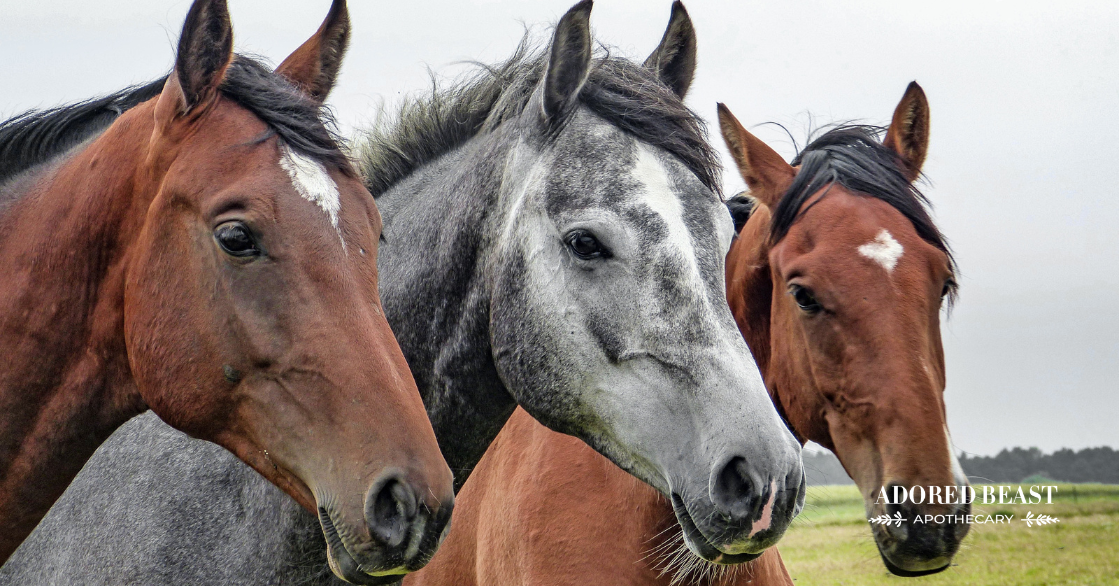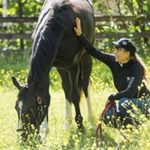I dare to say that the study of equine nutrition remains in the dark ages…
It’s sad to say, but no one actually knows what horses truly need to eat. Today’s horses are largely being managed with cured forage and the aid of synthetic supplements and feeds. The National Research Council, the organization that provides the best educated guess on nutrient requirements for the equine species, can only go by what is know. Unfortunately, that is extremely limited due to the lack of scientific research being done on equine nutrition. Instead, research is heavily focused on studying how to feed them synthetically instead of based on what they actually need to eat eg. a wide variety of naturally occurring forage!
Between modern management practices, poor understanding and execution of dietary needs, and elevated stress levels on the sport and pleasure fronts, many modern horses are suffering unnecessarily with diseases that involve nutrient deficiency. And you can’t fix what you don’t know…
In this post I want to dive into where things can go wrong with nutritional deficiencies in horses, and how to help your equine companions.
The Top 6 Nutritional Deficiencies in Horses
Let’s start with how to recognize the most common nutrient deficiencies, the causes, and the solutions to those issues. Then we will take it out a little wider and talk about the bigger picture.
1. Calcium Deficiency
Signs & conditions: Chronic injury, back pain/joint pain, neurological issues, bone spurs, string halt, metabolic disease
Systems most heavily affected: Musculoskeletal and neurological
Causes: Incorrect calcium/phosphorus ratio, excess starch and/or protein, confinement and drugs, esp. steroids.
Foods to Feed: Beet pulp & alfalfa (organic only!), chia seed, leafy veg
Supplementation for severe cases: Calcium citrate (buffered) – 2000mg/day for 4 weeks, then 2 x weekly after that
Blood testing: Check blood every 3 months to ensure you are getting results
[RELATED] For a more in-depth look at calcium deficiencies, check out this post.
2. Selenium
Signs & conditions: Typing up, skin/hoof disease, hypothyroidism, insulin resistance, fatigue, heavy metal toxicity, liver disease, dull coat, skin disease, sweet itch, immune dysfunction, hypothyroidism, insulin resistance, hoof growth issues (esp. cracks)
Systems most heavily affected: Musculoskeletal, immune, endocrine (thyroid and sugar met), liver tonic
Causes: Deficient diet, medications, excess dietary starch, heavy metal toxicity
Foods to feed: Whole organic oats, grass and hay but sadly, soils are too deficient now
Supplement: Organic selenomethionine – NOT synthetic which is toxic to the liver
Dosage: 1000-2000 mcg daily
Blood testing: Check blood every 6 weeks to ensure you are getting results
3. Magnesium
Signs & conditions: High anxiety, colic, muscle spasm, hard keepers, insulin resistance
deficient diet, gut damage, excess starch, stress/overtraining, medications
Systems most heavily affected: Musculoskeletal, immune, endocrine, digestive
Causes: Deficient diet, gut damage, excess dietary starch, stress, overtraining, some medications
Foods to feed: Grass/hay (ideally), green leafy veg, seeds (esp. chia)
Supplement: Magnesium citrate (NOT magnesium oxide)
Dosage: 1500mg daily OR acute colic – 2000-3000 mg – have in the first aid kit
4. Vitamin B12
Signs & conditions: Anxiety, colic, muscle spasms, insulin resistance, gut disease, neurological disorder, anemia, fatigue, weakness (seniors), liver toxicity
Systems most heavily affected: Digestive, endocrine, nervous systems
Causes: Gut damage, ulcers, stress/cortisol, low stomach acid, microbiome imbalance!
Food to feed: Feed the microbiome (keep reading), grass and hay, spirulina and seaweed, medicinal mushrooms (turkey tail, chaga, lion’s mane, shiitake, etc.)
Supplement: Methylcobalamine
Dosage: 6000-12000 mcg/day
Blood testing: Every 3 months
5. Vitamin E
Signs & conditions: Cataracts, arthritis, kidney/liver disease, neurological issues, senior horses, inflammatory diseases, eye issues, joint issues, aging
Systems most heavily affected: all body systems but often shows up neurologically
Causes: deficient diet, liver/kidney toxicity, neurological disease, aging
Foods to feed: black oil sunflower seeds, green leaf veg, grass, pumpkin seeds, dried cranberry, grapeseed oil
Supplement: d-alpha tocopherol (natural version) liquid! Powder is not bioavailable
Dosage: 1000-2000 IU daily and 3000-5000 IU prior and during competition or surgical/stressful events
Blood testing: Check blood every 3 months to ensure you are getting results
6. Omega 3 Fats
Signs & conditions: Chronic inflammation (anywhere in the body), ulcers, colic, joint-related inflammation and degeneration, kidney disease, skin disease, neurological disease
Systems most heavily affected: GI, urinary, nervous, immune
Causes: Deficient diet, stress, liver/kidney toxicity, gut damage, inflammation
Foods to feed: Freshly ground flax, soaked chia seed, phytoplankton, hemp
Supplement: Plant-based oils (flax, hemp, chia, camelina, ahiflower) – NOT FISH OIL!!!!
Dosage: (rotation use of the follow in best!)
- Soaked chia – ½ cup soaked seeds daily
- Freshly ground flax – 1-2 cups daily
- Hemp oil – 3-5 tbsp daily
- Phytoplankton – ½ tsp daily
…But wait! There’s 1 more!
7. Pre & Probiotics
when a horse lives in a field, they are eating microbes (dirt) all the time! They can’t diversify the microbiome and support a healthy microbial community without this regular environmental integration process. When they can’t graze, beneficial microbes are essential via probiotics and prebiotic fibres.
Remember: nutrients cannot be absorbed properly in a damaged gut. Nutrient absorption is heavily altered/diminished by gut damage so it’s imperative to get on top of it as soon as possible. You can feed the best of everything but if the gut is not well, nothing you’re feeding will make it into the cells. Using probiotics, ensuring some grazing time, and diversifying the diet with healthy whole foods means you’re feeding the microbiome proactively and this will result in production of a diverse number of metabolites, including folate, vitamin B12, short chain fatty acids and much more. These are essential for immune, metabolic, neurological, digestive function and beyond.
Other Tips to Complete the Nutrition Puzzle
There are several other things to consider when it comes to addressing nutritional deficiencies in horses.
- Blood testing – Useful blood tests to help you figure out what needs adjusting include a mineral blood profile, vitamin B12, folate, vitamin E and selenium testing. Based on what you are seeing, you can choose which of these tests seem most appropriate to start with. You’ll want to use your first test as a baseline and then test every 6-12 weeks thereafter until you’re seeing the nutrient levels you want to see. See above for specifics on when to repeat blood testing for different nutrients.
- Hay testing – Hay analysis is a crucial puzzle piece when it comes to solving nutritional deficiencies. If you don’t know what’s in your forage (eg. the largest part of your horse’s diet), then you’re hooped! Make sure you’re not just guessing with supplements and get your hay tested so you can make educated additions and subtractions to your horse’s diet. Work with an equine nutritionist if you don’t feel confident analyzing results on your own.
- Always establish a long term plan when dealing with deficiencies – meaning that even when you’re supplementing, start integrating a healthier diet along the way so that you aren’t just using supplements to address the underlying cause (often dietary deficiency).
As you can see, nutritional deficiencies in horses is an important issue to address. Nutrition is interconnected with almost all aspects of equine health and wellness so be sure you’re taking a good look at what your horse might be missing and make the changes they need to thrive. Happy feeding!












